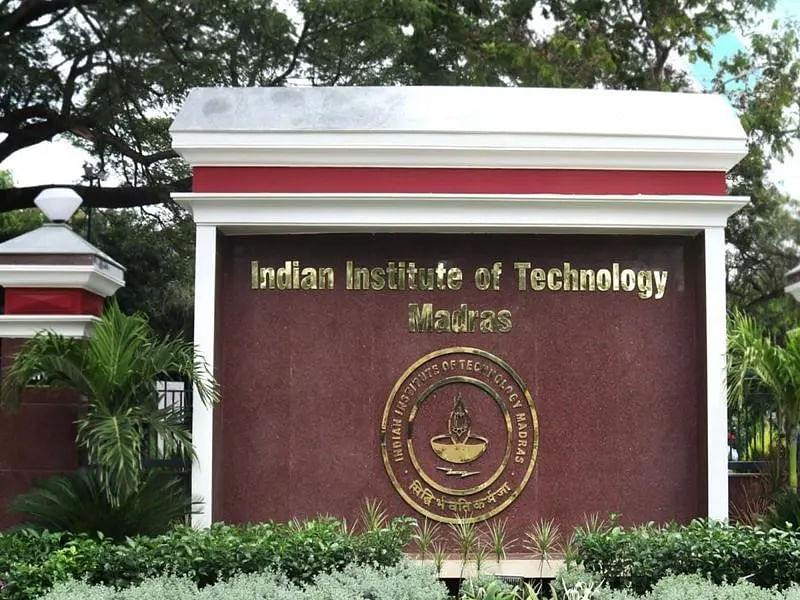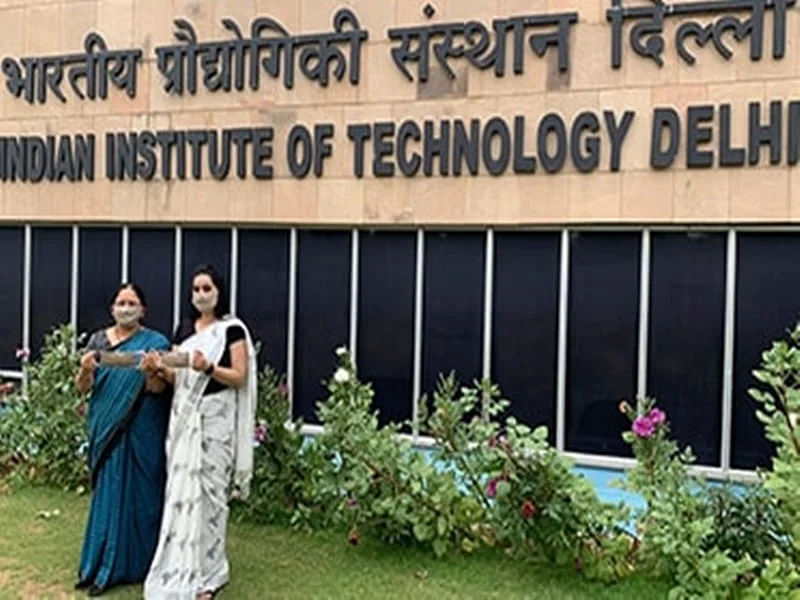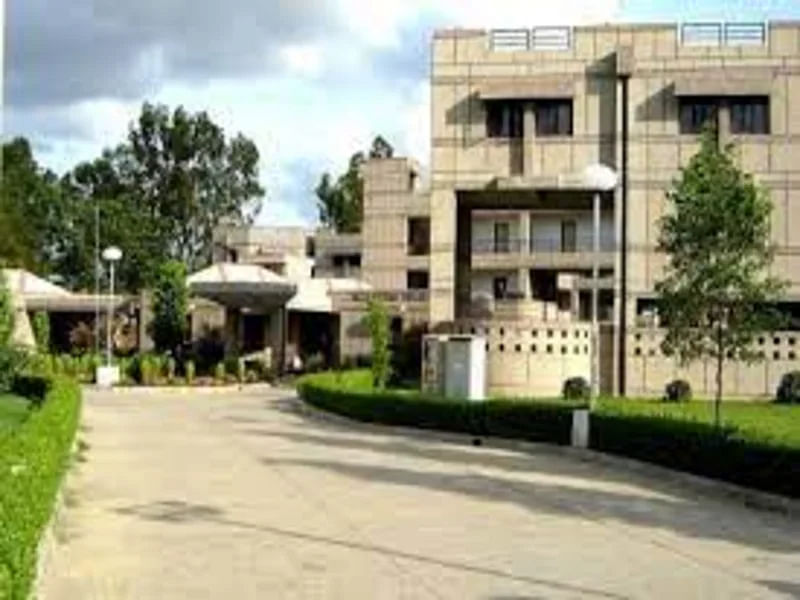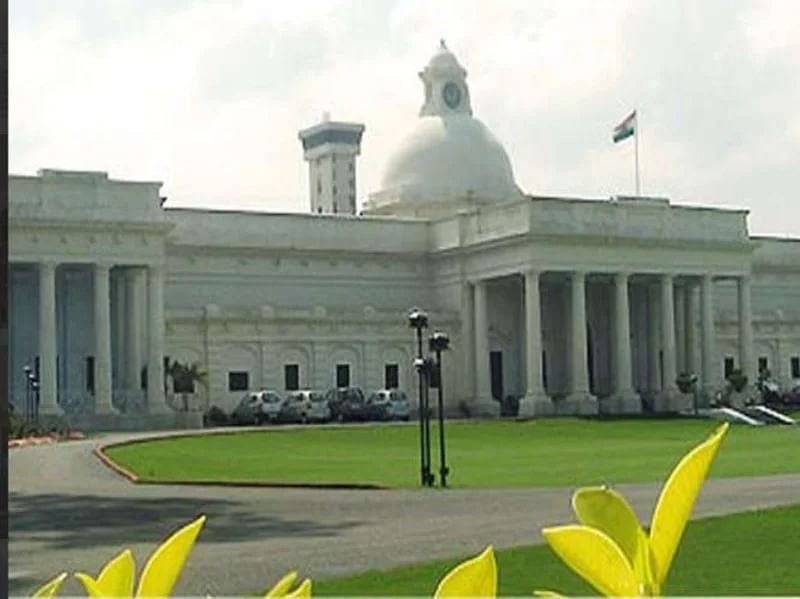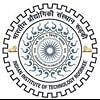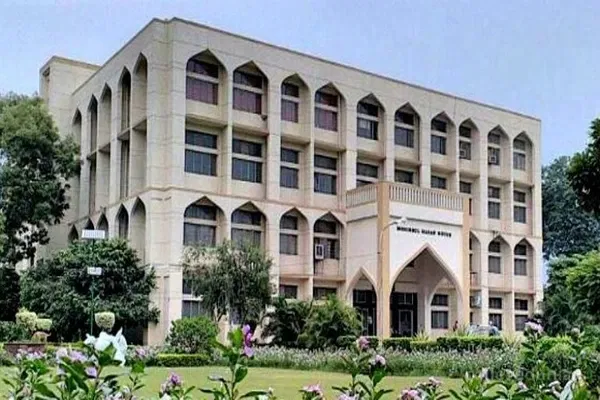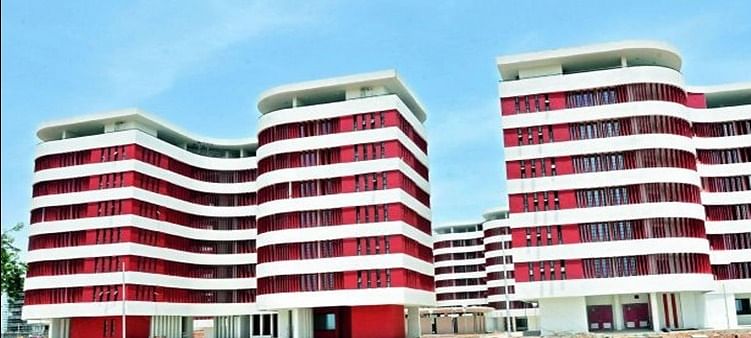B.Tech Electrical Engineering Syllabus and Subjects

The B.Tech Electrical Engineering syllabus is divided into eight semesters providing students with a comprehensive understanding of electricity and electromagnetism and its applications in different areas of technology and related fields. The BTech Electrical Engineering course curriculum is spread across four years offering a combination of core courses, elective offerings, and practical topics.
The core B.Tech Electrical Engineering subjects include Electrical Engineering, Engineering Thermodynamics, Measurements and Instrumentation, etc. The elective subjects include courses on High Voltage Engineering, Special Electrical Machine, Microprocessors and Microcontrollers, CAD of Electrical Machines, etc that enable students to specialise in their area of interest.
Table of Contents
B.Tech Electrical Engineering Syllabus Semester Wise
The B.Tech Electrical Engineering syllabus is based on the recommendations of the AICTE. Therefore, the syllabus of Electrical Engineering followed by most colleges are the same with slight variations in certain subjects, elective offerings, and practicals.
The semester wise BTech in Electrical Engineering syllabus is detailed in the sections below.
B.Tech Electrical Engineering 1st Year Syllabus
The 1st year BTech Electrical Engineering syllabus covers fundamental concepts of basic science and engineering such as Physics, Chemistry, Mathematics, Basic Electrical and Electronics Engineering, etc.
Listed below are the subjects covered in the B.Tech 1st year Electrical syllabus:
| Semester I | Semester II |
| Language (professional Comm. in English) | Introduction to Computing |
| Engineering Chemistry | Environment & Ecology |
| Engineering Physics I | Engineering Physics II |
| Mathematic I | Mathematics II |
| Engineering Mechanics | Engineering Thermodynamics |
| Basic Electrical Engineering | Basic Electronics |
Practical Topics for BTech Electrical Engineering 1st Year
The practical topics for BTech Electrical Engineering 1st year is outlined below.
- Chemistry Lab
- Physics Lab
- Engineering Mechanics Lab
- Electrical Lab
- Engineering Graphic I
- Workshop Practice - I
- Basic Electronics Lab
- Computer Programming Lab.
- Engineering Graphics II (M/C Drawing)
- Workshop Practice II
B.Tech Electrical Engineering 2nd Year Syllabus
The B.Tech Electrical Engineering 3rd semester syllabus covers important topics such as Computer Programming, Fluid Mechanics, etc. The B.Tech 4th sem Electrical Syllabus covers crucial topics such as Circuit Theory, Electromagnetic, Power System, and more.
The B.Tech Electrical Engineering syllabus 2nd year is provided in the table below.
| Semester III | Semester IV |
| Numerical Analysis & Computer Programming (C, C++) | Solid State Devices |
| Material Science | Circuit Theory |
| Strength of Materials | Electromagnetic Theory |
| Fluid Mechanics & Fluid Machinery | Electrical Machines - I |
| Mathematics III | Digital Electronics |
| Electrical Measurements and instrumentation | Power System - I |
Practical Topics for B.Tech Electrical Engineering 2nd Year
The practical topics for B.Tech Electrical Engineering 2nd year include:
- Numerical Analysis & Computer Programming (C, C++) Practical
- Material Science Practical
- Strength of Materials Practical
- Electrical Measurements and Instrumentation Practical
- Solid State Devices Practical
- Electrical Machines - I Lab
- Electromagnetic Theory Lab
B.Tech Electrical Engineering 3rd Year Syllabus
The B.Tech 3rd year syllabus for Electrical Engineering explores advanced concepts such as Power Systems, Control Engineering, Microprocessors & Microcontrollers, etc.
Listed below is the syllabus of B.Tech Electrical Engineering 3rd year.
| Semester V | Semester VI |
| Management Concepts and Techniques | Signals & Systems |
| Analog Electronics | Microprocessors & Microcontrollers |
| Control Engineering | Communication Engineering |
| Electrical Machines - II | Power Electronics |
| Power Systems - II | Power System Stability |
| Digital Electronics and Logic Design | Design of Control System |
Practical Topics for BTech Electrical Engineering 3rd Year
The B.Tech Electrical Engineering 3rd year practical topics are listed below:
- Analog Electronics Practical
- Electrical Machines - II Practical
- Power Electronics Practical
B.Tech Electrical Engineering 4th Year Syllabus
The BTech in Electrical Engineering 4th year syllabus allows students to choose from professional and open electives such as ERP, Software Technology, High Voltage Engineering, Special Electrical Machines, and more.
In addition, students also have projects in the final year of the course. Listed below is the semester wise BTech Electrical Engineering 4th year syllabus .
| Semester VII | Semester VIII |
| Computer Aided Power System | Open Elective - II |
| Network Synthesis | Professional Elective - II |
| Power System Protection & Switchgear | Professional Elective - III |
| Open Elective - I | High Voltage Engineering |
| Professional Elective - I | Digital Signal Processing |
| Colloquium | Project - II |
| Project - I | - |
Practical Topics for BTech Electrical Engineering 4th Year
The practical topics for B.Tech Electrical Engineering 4th year include:
- Computer Aided Power System Practical
- Switchgear & Protection Practical
B.Tech Electrical Engineering Subjects
The B.Tech Electrical Engineering subjects include theoretical coursework on basic science and core engineering subjects, with professional specialisation in areas of electrical engineering. It also included laboratory and practical sessions on these subjects.
The detailed BTech Electrical Engineering subjects list along with the topics covered are provided in the sections below.
BTech Electrical Engineering Subjects 1st Year
The BTech first year Electrical Engineering subjects cover topics such as Force Systems and Equilibrium, Thermoelectricity, Basics of Electrical Engineering, and more.
Listed below are the B.Tech first year Electrical Engineering subjects and the topics covered under them.
| Subjects | Topics Covered | Subject Type |
| Language (professional Comm. in English) | Writing, Reading Comprehension, Speaking, Group Discussion, Telephonic Conversation, Listening Comprehension. | Core |
| Engineering Chemistry | Atoms and Molecules, Solid State, Reaction Dynamics, Electrochemistry, Transition Metal Chemistry, Polymerization, Photochemistry. | |
| Engineering Physics I | Theory of Relativity, Geometrical Optics, Physical Optics, Thermal Physics, Acoustics, Dynamics of Fluids. | |
| Mathematic I | Calculus of Functions of One Variable, Leibniz’s Theorem, Taylor’s Theorem, Infinite Series, Calculus of Functions of Several Variables, Lagrange Multipliers, Vector Calculus. | |
| Engineering Mechanics | Force Systems and Equilibrium, Plane Trusses, Friction, Properties of Surfaces, Virtual Work, Kinematics of Rigid Bodies. | |
| Basic Electrical Engineering | DC Networks, Single Phase AC Circuits, Three Phase AC Circuits, Magnetic Circuits, Transformers, Induction Motors, DC Machines, Electrical Measuring Instruments. | |
| Introduction to Computing | Computer Devices, Concept of Notion of Program, Character Representation, Basic, Fortran, Pascal, Cobol. | |
| Environment & Ecology | Elements of Ecology, Air Pollution and Control, Water Pollution and Control, Land Pollution, Noise Pollution. | |
| Engineering Physics II | Vector Analysis, Electromagnetism, Thermoelectricity, Modern Physics, Solid State Devices. | |
| Mathematics II | Linear Algebra, Ordinary Differential Equations, Laplace Transforms, Numerical Methods. | |
| Engineering Thermodynamics | System, Control Volume, Dimensions, Units, Mechanics and Thermodynamics, Laws, Entropy, Ideal Gas, Real Gas, Analysis of Engineering Processes | |
| Basic Electronics | Semiconductor Diodes, Bipolar Junction Transistor, Field Effect Transistor, Electronic Instruments, Transducers, Display Devices and Recorders, Data Acquisition Systems. | |
| Chemistry Lab | Acid-base Titration, Redox Titration, Chemical Kinetics, Photochemical Oxidation, Viscosity of Solutions, Synthesis of Aspirin, Functional Groups in Organic Compounds, Conductometric Titration. | Laboratory/Practical |
| Physics Lab | Coefficient of Viscosity of Water by Capillary Flow, Lee’s Method, Searl’s Method, Newtons’ Ring Method, LCR Circuits with AC Current, Planck's Constant using Photocells. | |
| Engineering Mechanics Lab | Fletcher’s Trolley Apparatus, Moment of Inertia, Dry Friction, Effort Load, Friction Load, Efficiency Load, Polar Planimeter. | |
| Electrical Lab | Armature and Field Resistance of DC Machine, Circuit Theorems, Measurement of Current Voltage and Power, Single Phase Transformer, DC Shunt Motor, LCR Circuits with AC Currents. | |
| Engineering Graphic I | Lettering, Dimensioning, Scales, Sense of Proportioning, Projections, Projections of Points and Lines, Development of Surface, Isometric Projection, Nomography, | |
| Workshop Practice – I | Carpentry, Foundry, Metal Joining, Metal Cutting, Forging. | |
| Basic Electronics Lab | Characteristics Curve for Common Base Emitter & Common Collector Transducer, Field Effect Transistors, Operational Amplifiers, CRO, Data Acquisition System. | |
| Computer Programming Lab. | Flow Charts, Decision Tables, Examples and Practice Problems, DOS, UNIX, Computer Programs for Roots of Quadratic and Cubic Equations, Summation of N Natural Number, Separation of ODD and Even Numbers, etc. | |
| Engineering Graphics II (M/C Drawing) | I.S. Drawing Conventions Line Symbols, Projection, Perspective, Shape Descriptions, Glass-Box Concept, Sketching of Pictorial Views, Sectioning, Computer Aided Drafting. | |
| Workshop Practice II | Carpentry, Foundry, Metal Joining, Metal Cutting, Forging. |
BTech Electrical Engineering Subjects 2nd Year
The BTech Electrical Engineering 2nd year subjects focus on topics such as Electrical Measurements and Instrumentation, Solid State Devices, Electrical Machines, etc. The B.Tech Electrical Engineering subjects and topics covered are provided in the table below.
| Subjects | Topics Covered | Subject Type |
| Numerical Analysis & Computer Programming (C, C++) | Approximation and Round of Errors, Truncation Errors, Taylor Series, Roots of Polynomials, Transcendental Equations by Newton-Raphson, Curve Fitting, C, C++, Pointers. | Core |
| Material Science | Crystal Structures, Behaviour of Materials, Mechanical Properties of Materials, Dielectric Materials, Tensile and Compression Test, Polymers. | |
| Strength of Materials | Simple Stresses and Strains, Mechanical Properties of Materials, Mechanics of Rigid Bodies, Slope and Deflection, Thin Pressure Vessels. | |
| Fluid Mechanics & Fluid Machinery | Definition and Fluid Properties, Units and Dimensions, Dimensional Analysis and Similarity in Motion, Fluid Energy Conservation Systems. | |
| Mathematics III | Partial Differential Equations, Numerical Methods, Interpolation, Approximation, Integration, Ordinary Differential Equations. | |
| Electrical Measurements and Instrumentation | Standards of Measurement & Errors, AC Bridges, Instrument Transformers, Electronic Voltmeter, Instrumentation, Data Acquisition Systems. | |
| Solid State Devices | Properties of Insulators in Static and Alternating Fields, Magnetic Materials, Conductors, Semiconductors, Semiconductor Diode, Transistors. | |
| Circuit Theory | LC, Mutual Inductance, Controlled Sources, Transformers, Frequency Response, Coupled Circuits, Two-Port Networks, Elements of Filter Design. | |
| Electromagnetic Theory | General Principles, Source of Electromagnetic Field, Laplace and Poisson’s Equations, Rectangular, Electromagnetic Fields, Electromagnetic Wave Equation, Radiation and Antenna. | |
| Electrical Machines – I | Electromagnetic and Electromechanics, Maxwell‟s Equations, Three-Phase Transformers, Transient Parameters, Motoring Mode. | |
| Digital Electronics | Karnaugh Maps, Combinational Circuits, Half Adder, Comparator, Multiplexor, Transistor, Logic Gates, Memories, A/D and D/A Converters. | |
| Power System - I | Generation of Electric Power, Transmission and Distribution Systems, Cables, Tariffs & Load Curves, EHV/HVDC Transmission. | |
| Numerical Analysis & Computer Programming (C, C++) Practical | Numerical Integration by Trapezoidal and Simpson’s Rule, Gauss-Seidel Iteration Method, Matrix Operation, Pointers, Data Structures, Loops, Arrays. | |
| Material Science Practical | Lattice Structure, Miller Indices, Microstructure of Cast Iron, Mild Steel, Brass Solder, Hall Effect, Ductile and Brittle Materials, Common Alloys. | Laboratory/Practical |
| Strength of Materials Practical | Testing Equipments, Uniaxial Tension Test, Torsion Test, Bending Stress Distribution in Beams using Demec Gauges and Extensometer. | |
| Electrical Measurements and Instrumentation Practical | Kelvin’s Bridge, Price Guard-Wire Method, Schering Bridge, Digital Transducer, Time-Division and Frequency-Division Multiplexing, Phase Locked Loops. | |
| Solid State Devices Practical | PN-Junction and Point Contact Diodes, Bipolar Junction Transistor in Common Base and Common Emitter Configurations, Energy Band Gap, UJT, RC-Coupled Amplifier. | |
| Electrical Machines – I Lab | DC Machines, Hopkinsons’s Test and Field Visits, ASA Methods, V-Curves, Three Phase Alternator, Slip Test, Blondel’s Method, AVR. | |
| Electromagnetic Theory Lab | Field Plotting of Electromagnetic Systems, Applications for Low and High Frequency Devices. |
BTech Electrical Engineering Subjects 3rd Year
The BTech Electrical Engineering subjects 3rd year syllabus focuses on concepts such as control engineering, power systems, microprocessors and microcontrollers, etc.
The third year BTech Electrical Engineering subjects and the topics covered are listed below.
| Subjects | Topics Covered | Subject Type |
| Management Concepts and Techniques | Basic Concepts and Functions of Management, HR Management, Marketing Management, Production/Operations Management, Management Information System. | Core |
| Analog Electronics | Diodes & BJT’s, FET, Small Signal Analysis, Multistage Transistor Circuits, Power Amplifiers, Feedback in Amplifiers, Operational Amplifiers. | |
| Control Engineering | Industrial Control, Transfer Function Models, System Response, LVDT, DC and AC Servomotors, Tuning of Process Controller, State Variable Analysis, Optimal control & Nonlinear Control. | |
| Electrical Machines – II | Review of Polyphase Distributed AC Windings. Production of EMF, Coupled Circuit Equations, Speed Control, Braking, Special Electric Motors, Machines for Control Systems. | |
| Power Systems-II | Single Line Representation, Network Matrices, Short Circuit Studies, Load Flow Studies, Stability Studies, Power System Monitoring and Control. | |
| Signals & Systems | Dynamic Representation of Systems, Fourier Analysis of Continuous Time Signals and Systems, Laplace Transform, Z-Transform, Random Signals. | |
| Communication Engineering | Review of Frequency Bands Fourier Transform and Fourier Series, Amplitude Modulation Systems, Optical Communication Systems, Mobile Communication. | |
| Power Electronics | Power Semiconductor Devices, Electromagnetic Interference, AC to DC Converters, Single Phase and Multi-Phase Uncontrolled and Controlled Rectifiers, Cycloconverters. | |
| Power System Stability | System Modelling, Dynamics of Synchronous Generator, Small Signal Stability Analysis, Subsynchronous Frequency Oscillations. | Elective |
| Design of Control System | Frequency Response, Frequency Domain Specifications, Single Loop Systems, Lag, Lead, P.PDT, I, A.C. Carrier Control Systems, Modern Control Theory. | |
| Digital Electronics and Logic Design | Number Systems and Codes, Gates, TTI Circuits, Boolean Algebra and Karnaugh Maps, Arithmetic-Logic Units, Flip Flops, Registers and Counters, Memories, Operational Amplifiers. | |
| Microprocessors & Microcontrollers | Architecture and Programming of 8085 Microprocessor, Memory Interfacing, Applications, Intel 8051 Microcontroller, 8051 Peripheral Functions. | |
| Analog Electronics Practical | Multistage RC Coupled Amplifier, Current Mirror using BJTs, Series Voltage Regulator, Summer and Integrator Using OP-amps. | Laboratory/Practical |
| Electrical Machines – II Practical | Torque Speed Characteristics of Three Phase Induction Machine, Rotor Resistance, Speed Control of Induction Motor, Switched Reluctance Motor. | |
| Power Electronics Practical | V.I Characteristics of SCRS Triac & Diac, BJT, GTO & MOSFET, UJT Firing Circuit, PWM Control Signal, Harmonics & Reactive Power Measurement, AC Voltage Controller. |
BTech Electrical Engineering Subjects 4th Year
The B.Tech Electrical Engineering fourth year subjects include professional and open electives such as High Voltage Engineering, Special Electrical Machine, HVDC Transmission, Microprocessor Based System Design, etc.
Listed below are the fourth year BTech Electrical Engineering subjects and the topics covered under them.
| Subjects | Topics Covered | Subject Type |
| Computer Aided Power System | Power System Components, Optimal Power System Operation, Power System Security, State Estimation, Power System Stability, CAD Power System Protection. | Core |
| Network Synthesis | Synthesis Problem, Basic Impedance Synthesis Problem, Reciprocal and Synthesis, Second Order Systems, Scattering Matrix Synthesis. | |
| Power System Protection & Switchgear | Protection, Classification of Relays, Current Trends in Protective Relaying, Switchgear, Fault Analysis, Test and Selection of Circuit Breakers. | |
| High Voltage Engineering | Breakdown in Gases, Breakdown in Liquid and Solids, Impulse Generator, Generation of High Voltage, Measurement of High Voltage. | Elective |
| Digital Signal Processing | Sampling, Data Reconstruction Process, Z Transform, Discrete Linear System, Discrete Fourier Transform, FFT Algorithm, High Speed Convolution. | |
| Computer Aided Power System Practical | Simulating Power System Components, Analysing Power Flow, Performing Optimal Studying Power System Stability, Power System Design. | Laboratory/Practical |
| Switchgear & Protection Practicals | Testing and Calibration of Protective Relays, Types of Circuit Breakers, Testing and Selecting Appropriate Protective Devices. |
BTech Electrical Engineering Course Structure
The B.Tech Electrical Engineering course structure is designed for a period of four years focusing on providing comprehensive and quality education to students. The course structure followed by BTech Electrical Engineering programs in India are outlined below:
- VIII Semesters
- Core Subjects
- Elective Subjects
- Practicals
- Internships
- Project
BTech Electrical Engineering Teaching Methodology and Techniques
The B.Tech Electrical Engineering course employs diverse methodologies and techniques to meet the dynamic nature of the field. Students are introduced to various holistic methods along with traditional lecture based methods aiming at overall development.
The BTech Electrical Engineering teaching methodologies and techniques are listed below:
- Lectures
- Laboratory
- Case Studies
- Group Discussion
- Guest Lecturers
- Industrial Visits
- Workshops
- Seminars/Colloquium
BTech Electrical Engineering Projects
Projects play an integral part in the BTech Electrical Engineering curriculum allowing students to apply their theoretical knowledge into practical applications. Some of the popular project topics within BTech Electrical Engineering include:
- Design and Implementation of a Smart Grid System for Efficient Power Distribution.
- Design and Construction of an Automatic Voltage Regulator for Voltage Stabilization.
- Design and Simulation of a Microcontroller-based Power Factor Correction System.
- Implementation of a Fault Detection and Protection System for Power Distribution Networks.
- Implementation of a Home Automation System using IoT and embedded systems.
- Development of Renewable Energy-Based Power Generation System.
BTech Electrical Engineering Books
The B.Tech Electrical Engineering books cover foundational concepts and theories, methodologies, practical applications, and laboratory experiments for students to refer to.
The year-wise B.Tech Electrical Engineering books followed in most colleges is provided in the sections below.
B.Tech Electrical Engineering Books First Year
The first year B.Tech Electrical Engineering books cover foundational concepts and topics such as electrical engineering, mechanics, engineering graphics, etc.
The 1st year B.Tech Electrical Engineering books are provided in the table below.
| Books | Authors | Topics Covered |
| Electrical Engineering Fundamentals | Vincent Del Torro | Circuit Analysis Techniques, Principles of Electromagnetism, Electrical Power Systems. |
| Electrical Technology | Edward Hughes | Basic Electrical Circuits, Electrical Components and their Characteristics, Electrical Machines. |
| Mechanics for Engineers | F.P. Beer and F.R. Johnston | Force Systems and Equilibrium, Mechanics of Materials, Kinematics and Dynamics of Particles. |
| Engineering Graphics | K.L. Narayana and P. Kannaiah | Engineering Drawing Fundamentals, Orthographic Projection, Isometric and Perspective Drawings. |
| Electronics Devices & Circuit Theory | Robert Boylesta & Louis Nashelsky | Semiconductor Physics and Devices, Basic Electronic Circuits, Transistor Amplifier Configurations. |
B.Tech Electrical Engineering Books Second Year
The B.Tech Electrical Engineering second year books cover topics such as standards of measurement & errors, field plotting of electromagnetic systems, electric power, etc.
Listed below are the 2nd year B.Tech Electrical Engineering books for the second year.
| Books | Authors | Topics Covered |
| Strength of Materials | Surendra Singh | Stress and Strain Analysis, Mechanical Properties of Materials, Beam Bending and Shear Forces. |
| Introduction to Fluid Mechanics | R.W. Fox and A.T. Mc Donald | Fluid Properties and Behaviour, Fluid Statics, Fluid Dynamics and Flow Analysis. |
| Modern Electronic Instrumentation and Measurement Techniques | Helfrick and Cooper | Sensors and Transducers, Signal Conditioning Techniques, Data Acquisition Systems. |
| Network Analysis | Van Valkenburg | Network Theorems, Circuit Analysis Techniques, Frequency Domain Analysis. |
| Power System Analysis | J. John Grainger and W.D. Stevenson Jr. | Power Generation and Transmission, Load Flow Analysis, Fault Analysis in Power Systems. |
B.Tech Electrical Engineering Books Third Year
The third-year B.Tech Electrical Engineering books deal with advanced concepts of electrical engineering such as power electronics, power systems, controls systems, etc.
The B.Tech Electrical Engineering third year books are listed below.
| Books | Authors | Topics Covered |
| Microprocessor Systems | I.P. Singh | Microprocessor Architecture, Assembly Language Programming, Interfacing Techniques. |
| Communication Systems | Simon Haykins | Analog and Digital Modulation Techniques, Transmission Lines and Waveguides, Multiplexing and Multiple Access Techniques. |
| Power Electronics: Circuits, Devices and Applications | H. Rashid Muhammad | Power Semiconductor Devices, AC to DC Conversion Circuits, Switching Power Supplies. |
| Power System Dynamics : Stability and Control | K.R. Podiyar | Power System Stability Analysis, Control of Power System Oscillations, Voltage and Frequency Control Techniques. |
| Control Systems: Principles and Design | M. Gopal | Feedback Control Systems, Control System Design Methodologies, Stability and Performance Analysis Techniques. |
B.Tech Electrical Engineering Books Fourth Year
The fourth year B.Tech Electrical Engineering books cover important topics such as measurement of voltage, data structures, power system security, etc.
Listed below are some of the B.Tech Electrical Engineering books used in the fourth year.
| Books | Authors | Topics Covered |
| Power System Engineering | I.J. Nagrath and D.P. Kothari | Power System Operation and Control, Stability Analysis, Protection and Relaying. |
| Passive and Active Network Analysis and Synthesis | Budak Aram | Passive Network Synthesis Techniques, Active Network Analysis Using Operational Amplifiers, Network Synthesis. |
| Protective Relays: Their Theory and Practice | A.R. Van and C. Warrington | Principles, Types, Relay Coordination, Fault Analysis Techniques. |
| High Voltage Engineering | M.S. Naidu and V. Kamaraju | Breakdown Phenomenon in Gases, Liquids, and Solids, High Voltage Generation Techniques, Insulation Coordination and Testing of High Voltage Equipment. |
| Digital Signal Processing | Oppenheim & Schafer | Discrete Signal Processing Fundamentals, Discrete-time Signal Processing Techniques, Design and Implementation of Digital Filters. |
Top B.Tech Electrical Engineering Colleges
Top Engineering Entrance Exams
B.Tech Electrical Engineering Fee Structure
FAQs on B.Tech Electrical Engineering Syllabus and Subjects
Q: What are the subjects in 1st year electrical engineering?
Q: Does Electrical Engineering have coding?
Q: What topics are covered in BTech 3rd semester Electrical Engineering syllabus?
Q: Is there Maths in BTech EE?
Q: Which are the toughest subjects in BTech Electrical Engineering?
Q: What are the elective subjects in BTech Electrical Engineering?
Q: How are the students evaluated in the B.Tech Electrical Engineering course?
Q: What courses can I pursue after B.Tech in Electrical Engineering?
